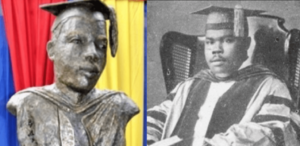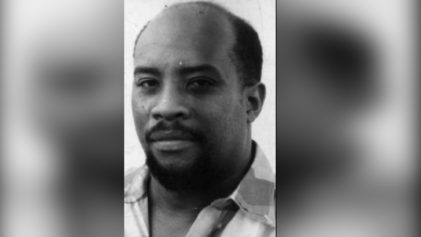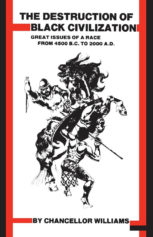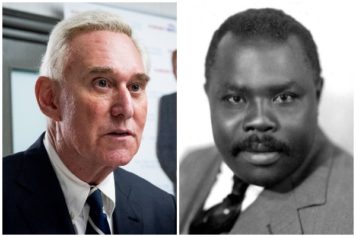
It is with this backdrop that an effort is underway to protest a bust of Garvey at the University of the West Indies (UWI) at Mona, Jamaica. Critics maintain the statue looks too European, and, in any case, does not resemble Garvey. Created by artist Raymond Watson, the bust depicts a modest, slender and slight looking Marcus Garvey that arguably looks nothing like his photographs and does not project the power and Blackness conveyed in the writings and philosophy we have come to know from the man.
Last week, Ka’Bu Ma’at Kheru, pan-Africanist and host of the of Irie FM’s morning show Running African, started an online petition at Change.org entitled, “Fake Garvey Bust at The University of the West Indies Must Come Down.” In the petition — calling the bust “an unfortunate misrepresentation of Jamaica’s First National Hero and one of the greatest philosophers of the 20th century”— Kheru implores UWI to remove the statue and replace it with a genuine symbol and representation of the leader.
“More than any other Jamaican, Mwalimu Marcus Mosiah Garvey is the embodiment of Blackness, of race pride and of the need to accept the Black skin/face as a badge of honor and NOT a symbol of shame!” the petition reads. “To unveil and raise a bust which denies this great Pan-African of his racial identity, his strength of character, his defiance of the status quo and the pride in his African identity is to betray everything that this great African-Jamaican stood for.”
The petition adds that an authentic representation of Garvey “is an imperative in the name of Justice, on the principle of Truth and ensuring that these principles are enshrined for posterity!”
Thank You to those who have supported! Over 300 signatures! Fake Garvey MUST GO!! Sign the #petition https://t.co/mk84lqKJDO #MarcusGarvey pic.twitter.com/mBlMYo2FTJ
— IRIE FM (@IRIE_FM) June 2, 2017
Legendary Jamaican singer Tony Rebel weighed in, arguing that UWI must be expected to create a true image of the Pan Africanist leader.
“Marcus Garvey is the first national hero of Jamaica, someone who is a renowned philosopher,” Rebel said. “Marcus Garvey is the inspiration of Malcolm X, of Malcolm X’s father, of Martin Luther King and Barack Obama.”
The veteran musician noted the importance of the highest educational institution in Jamaica creating an image of Garvey and insisted that UWI present the leader in a truthful way.
“They say it is a youthful Marcus Garvey, but it doesn’t look like him,” Rebel said, also noting that many people who knew and met him are still alive, including his son. Rebel placed the issue of the bust within the context of the history of Garvey in Jamaica.
“In Jamaica, people say Marcus Garvey should be taught in school, and his philosophy, but nobody is doing that. It is a perpetuation of the disrespect,” he said. “It doesn’t even have to be that they are deliberately doing this, but it is ingrained in the minds of the people.”
Marcus Mosiah Garvey created a form of Black nationalism built upon unity, autonomy and cultural pride, having an influence on subsequent movements such as the Nation of Islam and the Rastafari movement. He founded the Universal Negro Improvement Association (UNIA) over a century ago, at a time of colonialism, subjugation and racial oppression for Black people throughout the African diaspora. The UNIA was a mass movement of historic proportions, with membership as high as eight million people throughout the U.S. and Canada, the Caribbean, Latin America and sub-Saharan Africa at its height.
The organization’s first international convention in Madison Square Garden in New York drew 25,000 people from all over the world. Garvey’s Negro World newspaper had a circulation between 50,000 and 200,000, and his Black Star Line was an initiative to connect the people of the African diaspora through transport and trade.
Although he was from Jamaica and became the first national hero of Jamaica, Garvey was able to accomplish more outside of his native land than within its boundaries. His success in the U.S. in the early 20th century is a prime example, so much so that Uncle Sam decided to take action against him and the movement he built for the empowerment of Black people.
Decades before J. Edgar Hoover waged a war against Black people and prevented the rise of a Black messiah through his COINTELPRO program, the FBI chief went after Garvey. As Biography.com reported, Hoover was fixated on ruining Garvey for his ideas and his power in mobilizing Black people, calling Garvey a “notorious Negro agitator” and even hiring the first Black FBI agent so he could infiltrate Garvey’s organization and conduct surveillance on him.
“They placed spies in the UNIA,” historian Winston James said. “They sabotaged the Black Star Line. The engines … of the ships were actually damaged by foreign matter being thrown into the fuel.”
The U.S. Department of Justice indicted Garvey for mail fraud, and he was convicted in 1923 and imprisoned in 1925. The U.S. finally deported him to Jamaica in 1927. What happened to this Pan-Africanist visionary when he returned to Jamaica is significant, demonstrating that, as the Jamaica Information Service concluded, “The world of the 1930s was not ready for Garvey’s progressive ideas.”
Garvey was welcomed by thousands upon returning to Jamaica, and while he was regarded as a hero by the poor, the ruling elites regarded him with suspicion and feared his popularity and reputation, according to Roxanne Watson of the University of South Florida. In 1929 Garvey founded the People’s Political Party, Jamaica’s first political party, whose manifesto supported self-government for Jamaica, workers’ rights, land reform, free secondary education and punishment for judges who act unfairly, among other things. Garvey was soon after charged with contempt of court for criticizing the nation’s legal system. Although his conviction was later overturned, as Watson noted, his trial effectively served to neutralize his political programmatic efforts toward uplifting the race. Finally, Garvey left Jamaica in 1935 and moved to London, where he died in 1940.
Last year, the Jamaican government announced steps to expunge Garvey’s criminal record, years after he became Jamaica’s first national hero. The struggle to honor Marcus Mosiah Garvey in a fitting way continues.


